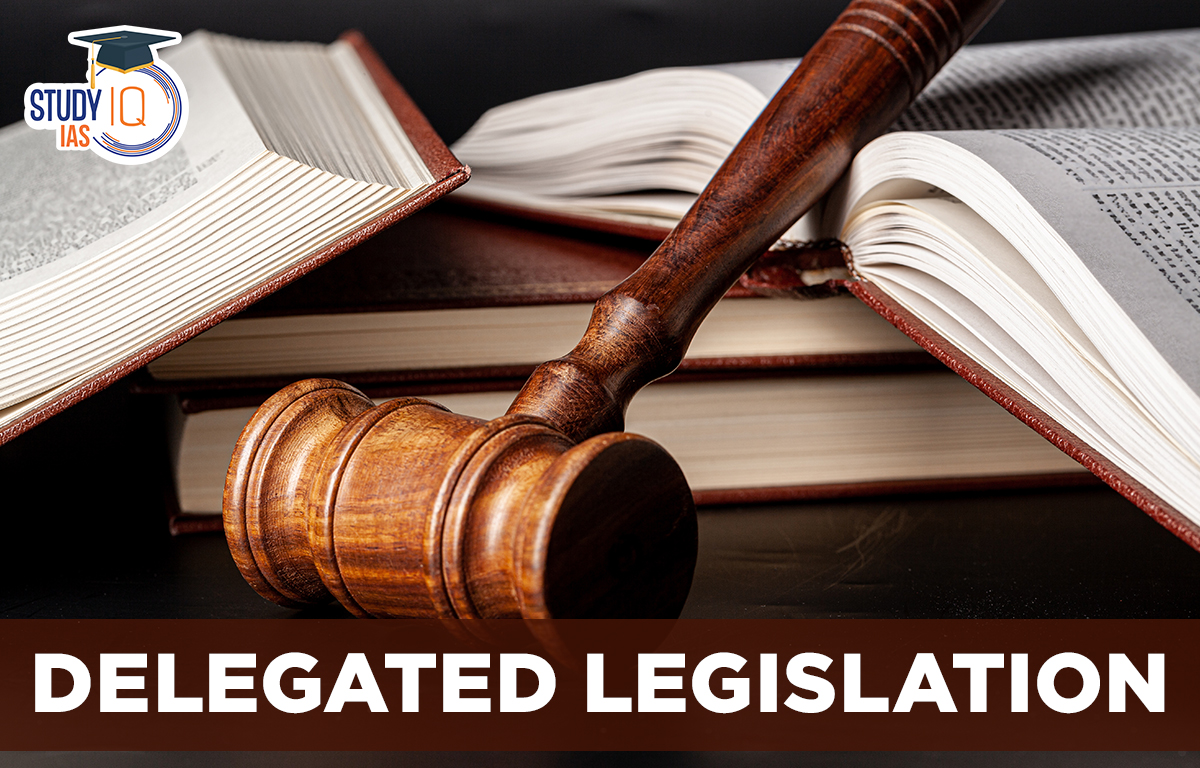Table of Contents
What is Delegated Legislation?
- ‘Delegated legislation’ refers to the exercising of legislative power by an agent who is lower in rank to the Legislature, or who is subordinate to the Legislature.
- The Parliament of India delegates certain functions to authorities established by law since every aspect cannot be dealt with directly by the lawmakers themselves.
- Function: The delegated legislation would provide operational details, giving power to those executing the details. Regulations and by-laws under legislation come under delegated legislation.
Supreme Court’s Opinion on Delegated Legislation
- The Supreme Court in 1973 said that empowering the Executive to make subordinate legislation within a prescribed limit has evolved out of practical necessity and pragmatic needs of a modern welfare State.
- It has to be noted that India’s Constitution-makers have entrusted the power of legislation to the representatives of the people so that it can be exercised not only in the name of the people but also by the people acting through their representatives.
Need for Delegated Legislation
- Limited time of Legislature: Legislature has limited time to make laws on each and every matter. It does not have enough time to enact the laws in detail.
- Lack of speciality: Legislature has a limited speciality in the case of technical details. After making a structure, the job is delegated to the government department having expertise.
- Emergency situation: In case of internal or external emergency, the legislature is not equipped with the skills of providing an urgent solution.
- Complex conditions: Modern administration is complex, which requires additional focus on holistic issues such as employment, health, education, regulating trade, etc. while making laws.
Criticism of Excessive Delegation Powers
- Degrade legislative control: Excessive delegation will remove the legislative control over the law-making process. This reduces the importance of the legislature.
- Violate principles of democracy: Unelected members of the executive making laws go against the spirit of democracy.
- Lack of discussion: Delegated legislation does not involve detailed discussions. This will remove scrutiny provided by the legislature during normal law-making.
- Separation of power: Law-making is the domain of legislature based on the theory of separation of power. Excessive delegation goes against this theory.
Issue of Delegation Power in the Case of Demonetization
- Under Section 26(2) of the Reserve Bank of India Act, 1934, the Union government has power to notify that a particular denomination of currency ceases to be legal tender.
- The centre, after the recommendation of the Central Board of RBI, by notification in the Gazette of India, declare that, with effect from a particular date, any series of bank notes of any denomination shall cease to be legal tender.
- The Parliament enacted the RBI Act to delegate power to alter the nature of legal tender to the central government.
- Using the powers, the centre issued gazette notification, which is essentially the legislative basis for the demonetization exercise.
Challenging the Powers
- The petitioners had argued that, even though Section 26(2) permits centre to carry out demonetization, it suffers from excessive delegation of legislative power thereby violating constitution.
- Petitioners further argued that in case of demonetization, since Section 26(2) contains no policy guidelines on how the Centre can exercise its powers, it is arbitrary and therefore, unconstitutional.
The Court’s Ruling
- Majority verdict: The majority verdict held that delegation powers cannot be stuck down since the power is given to the Centre which is anyway answerable to the Parliament.
- Minority verdict: The dissenting judge held that Centre could not have exercised its delegated powers because Section 26(2) of the RBI only gives powers to the Centre when the recommendation is “initiated” by the RBI Central Board.
- The judge further added that even if the Centre has the power under Section 26(2), allowing for demonetization of “any” notes is a vast power that is arbitrary and therefore unconstitutional.


 India’s First Full-Stack Quantum Compu...
India’s First Full-Stack Quantum Compu...
 World Liver Day 2025, Theme, History, Ce...
World Liver Day 2025, Theme, History, Ce...
 Kailash Mansarovar Yatra to Resume Soon,...
Kailash Mansarovar Yatra to Resume Soon,...





















